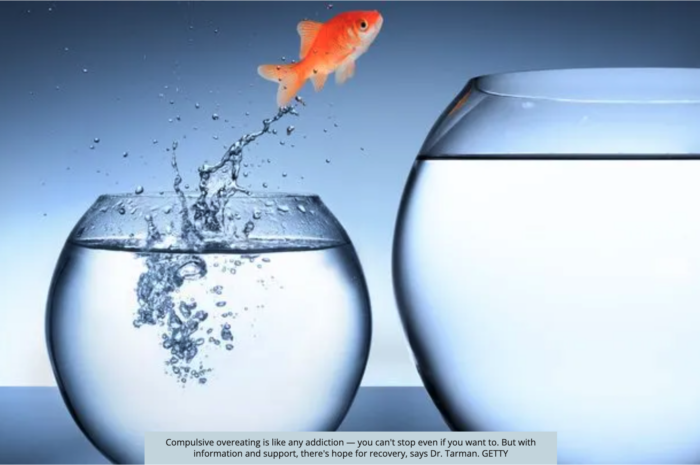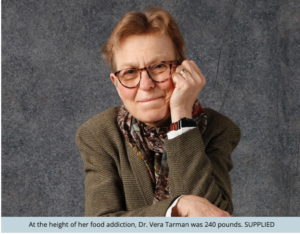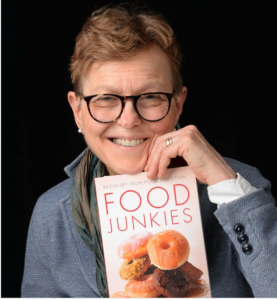
If you think about food all the time, behave in embarrassing ways around food and don’t want people to see how you eat, you may be a food addict, says Dr. Tarman.
by Karen Hawthorne – first published in Healthing on March 15, 2023.
This is the fourth of five interviews in the “Your Health Matters Summit” series, where we spend a few moments speaking to each of the experts who shared their expertise for the summit, which was hosted by Obesity Matters. These stories will explore obesity from a medical perspective; take a look at happiness and why it’s not necessarily connected to weight; learn about food addiction; and finally get why eating less and exercising more isn’t always the answer.
Dr. Vera Tarman , addiction expert and author of Food Junkies: The Truth About Food Addiction , has lived experience. She’s the medical director of a residential addiction treatment centre in Toronto, and a recovering food addict who lost 100 pounds — she has kept it off for 15 years. She also has a Facebook group I’m Sweet Enough: Sugar-Free for Life Support Group as a grassroots resource network. Healthing spoke with Tarman about what drives food addiction, what to do if you think you may be a food addict and how people can make positive change for better health.
Let’s start by defining food addiction.
Dr. Tarman: Food addiction is compulsive eating. That could be over or under, usually it’s compulsive overeating that is uncontrollable, which is the compulsive part that causes disturbance to the person. There’s an impairment that happens and they’re not able to control it — which is what addiction is to anything, like gambling or alcohol or cocaine.
When we talk about compulsivity, there’s a sort of obsessiveness about the person’s behaviour around food so they can’t stop thinking about it. It takes over a lot of mental real estate, which we call in the addiction world, “craving” or “obsession.” So that’s the first piece. The second piece is that it’s usually targeted towards what we call trigger foods, but it can actually be behaviour as well, so it could be just the act of eating. You can be addicted to eating normal foods, but generally, it’s trigger foods that are typically sugar and flour, processed food and processed carbohydrates.
Then that obsessive behaviour gets in the way of regular life. They’ll eat, they’ve made a plan to go out, but they’re so full now, or they would rather eat than go out. So they start cancelling activities. They may not even go into work. They might be spending more money on food or doing things like stealing food or eating food that’s not appropriate, for example, like they just saw it on a restaurant table. Food addiction has signs that definitely goes outside of the realm of normal behaviour. People who are new to the concept will recognize this by, ‘I’m gaining weight and I know I should stop, but I’m still eating and now I’ve got diabetes for God’s sake.’ There’s an impairment there, but with an inability to stop.
What are some of the clues that you might have an addiction to food?
Dr. T.: Are you thinking about food all the time or more than you want to? That would be the first thing. And then, are you behaving around food in a way that’s embarrassing, that you’re ashamed of and you don’t want people to see how you eat? You prefer to eat alone and you lie about how you eat or what you eat. It’s the same kind of behaviour as somebody who’s drinking and doesn’t want people to know.

The next one is, are you eating in a way that, even though it’s disturbing your life, your blood sugar levels, the numbers on the scale, you can’t stop and you want to stop. Usually, people with addiction come to a place where it’s not about missing my favourite drink or my favourite food. It’s ‘I wish I could stop,’ but they can’t. When we get to that stage, it’s almost like a withdrawal because people will say, ‘If you tell me that I can’t have my favourite bread or my favourite muffin, I won’t be able to work. I won’t be able to go to sleep tonight’ because they become dependent on it. When you fulfil all of those criteria, that’s when you say, ‘OK, this is somebody who’s got a bona fide food addiction.’
Are some people more susceptible to food addiction than others?
Dr. T.: The people who typically get food addiction are people who quit smoking. They’re used to having an addiction and then they figure that they’ll eat something instead. And before they know it, now they have a sugar addiction instead of a smoking addiction. Or someone wants to quit alcohol and then they find that they’re eating instead. They just pack on the pounds because they’ve virtually transferred their addiction. So you have compulsive eating behaviour that you can’t control even when it’s causing you grief.
Another one would be a genetic predisposition. So if mom and dad had an addiction to alcohol, very commonly, there’s alcohol history or there’s obesity history. Not all people who are obese are food addicts, but a high percentage are, about 60 per cent. In the general population, it’s probably about 10 to 20 per cent. Also, if a person has had a history of trauma or addiction in the family, neglect in the family, abuse, maybe a history of sexual abuse, the person may have been using food as a way to comfort themselves in the same way another person would be using drugs.
And if you live in 2023 in a country where you’re eating a lot of processed foods like Canada, America, the processed food industry makes foods that they call highly palatable, but they are essentially addictive. If that’s all you’re eating, then you’re going to be more prone to becoming addicted.
What’s your opinion on fasting? Dieting?
Dr. T.: I’m not a fan of diets. People, especially those who are overweight, will say that they dieted themselves into obesity. Because what happens with dieting is it’s a short-term solution. When they stop the diet, they gain the weight back plus more. Dieting is not only an easy way to gain more weight, but it’s also easy to develop an eating disorder or even food addiction because you’re stopping and starting and you’re putting yourself into deprivation. Anything that you can’t live with the rest of your life, don’t do. It doesn’t make sense because the moment you stop it, it’s just going to come back and hit you in the face.

I agree with lifestyle change where you’re going to change your food behaviour in such a way that you could live with it for the rest of your life. Fasting or intermittent fasting is not good from an addiction point of view or to lose weight. One of the things, especially for food addiction, is that hunger is a big trigger to binge. And what happens when you fast? You get hungry. But if it’s done for health benefits, if you’ve got diabetes, it’ll help with the diabetes. If you’ve got a metabolic syndrome, it helps with those, so you should do it with a health-care provider.
There are going to be people reading this who may start to see themselves in some of your descriptions. What should be their first step to get help?
Dr. T.: I want to reassure people that it’s a spectrum with early stages, mid-stage, later stage, much like alcoholism. It starts off with drinking too much, and at some point they cross a line and then they’re in trouble. A lot of people who are in the early stage are just starting to ask questions. Once you’re a food addict, you usually know you’re in trouble. But if a person is like, ‘Am I in trouble or am I not?’ they should learn what they can about this so that they don’t become one.
It’s also important to recognize that this is like depression and anxiety. Food addiction is a biological, psychological phenomenon. It’s not about willpower. It’s not because you’re a pig and you don’t know how to stop. It’s about recognizing that something has taken over — remember the definition of addiction is you can’t stop even if you want to. You want to get information, then next, is to get support, and the third thing would be to know there is hope. Once you recognize the first two things, there is hope.
Can you share a bit about your personal experience with food addiction?
Dr. T.: Like many people, I did the yo-yo dieting, I was 240 pounds. I’m now just under 140. But at 240, it would go down, go up, go down, go up and I felt really hopeless and like I couldn’t control it. Now that I understand that this is an addiction and treated it like an addiction, it freed me from the hold that it had on me. It also enabled me to stabilize weight in a way that drugs and surgery cannot do. So if you want to have a solution that will maintain weight and relieve you of the obsession to want to eat all the time, you need to buy into this concept of food addiction.
Every day when I sit down at my meal, I’m not sitting there thinking, ‘I wish I could have that ice cream cone that I used to have.’ I’m thinking to myself, ‘I love these roasted Brussels sprouts and I love the greens that I’ve made.’ I love that food because I don’t have the junk food that robs you of the flavour and takes away your tastebuds. Now I really enjoy healthy foods in a way that I couldn’t have imagined before. So it’s a life of enjoying food that also comes with good sleep, stability and mental stability. How can you not want that?
Read the other interviews in the series: Gillian Mandich, happiness expert, on what it takes to be happy, Dr. Sean Wharton, who envisions a future of obesity management that looks very different and Tedi Nikova, a weight loss focused on helping people improve unhealthy relationships with food.